 Petzlover
Petzlover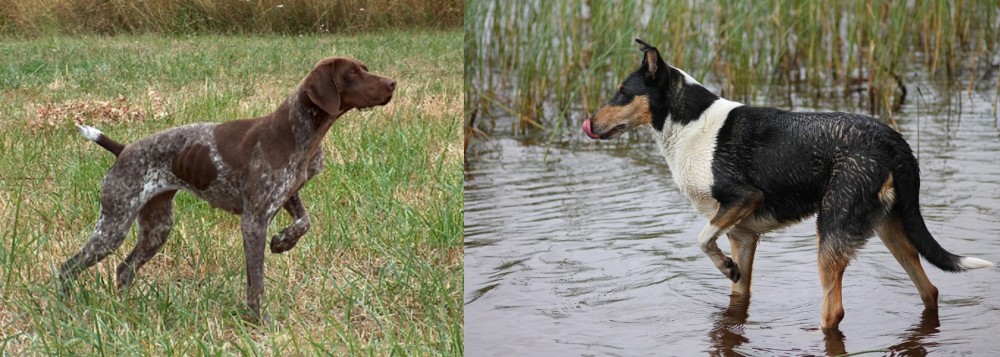 Braque Francais is originated from France but Smooth Collie is originated from United Kingdom. Braque Francais may grow 13 cm / 6 inches higher than Smooth Collie. Braque Francais may weigh 25 kg / 56 pounds more than Smooth Collie. Both Braque Francais and Smooth Collie has same life span. Both Braque Francais and Smooth Collie has almost same litter size. Braque Francais requires Low Maintenance. But Smooth Collie requires Moderate Maintenance
Braque Francais is originated from France but Smooth Collie is originated from United Kingdom. Braque Francais may grow 13 cm / 6 inches higher than Smooth Collie. Braque Francais may weigh 25 kg / 56 pounds more than Smooth Collie. Both Braque Francais and Smooth Collie has same life span. Both Braque Francais and Smooth Collie has almost same litter size. Braque Francais requires Low Maintenance. But Smooth Collie requires Moderate Maintenance
 Braque Francais was at first one general breed of hounds in the Gascognes and Pyrenees Mountains areas of France. The one breed became two. Known as the Braque Francais Gascognes and the Braque Francais Pyrenees - two separate breeds of very alike dogs. The Gascognes is a lot less common than his smaller brother. Not very much is known about the beginnings of these two strains of Braque Francais as the breed has been around since at least the 15th century. Because the Braque Francais was exported or taken to so many different countries in the 15th-18th centuries, a lot of the origins of the breeds were lost. A major bloodline search was The conducted in the 19th century and found that these were two very distinct breeds of dog.
Braque Francais was at first one general breed of hounds in the Gascognes and Pyrenees Mountains areas of France. The one breed became two. Known as the Braque Francais Gascognes and the Braque Francais Pyrenees - two separate breeds of very alike dogs. The Gascognes is a lot less common than his smaller brother. Not very much is known about the beginnings of these two strains of Braque Francais as the breed has been around since at least the 15th century. Because the Braque Francais was exported or taken to so many different countries in the 15th-18th centuries, a lot of the origins of the breeds were lost. A major bloodline search was The conducted in the 19th century and found that these were two very distinct breeds of dog.
It is known that France was the birthplace of this breed and it was developed because of a need for a tracker that could point, flush and retrieve. The Braque Francais Gascogne probably came from the south of France. It is related to the German Shorthair Pointer and the English Pointer as well. Having existed since the 15th century, he was the father of all pointing dogs in France. By the 17th century the breed had grown enough to be called the “old style Braque Francais”,
Though the origin of the breed is not known there are of course several theories about it. The most prevalent belief is that the Braque Francais Gascogne is a descendent of the Chien d’Oysel, a spaniel breed of medium size and white or brown with brown markings. The Chien d’Oysel is an ancient breed used for hunting prior to the 13th century. Hunters crossed the Chien with local dogs on a routine basis.
Braque Francais came out of these breedings. It was probably French Scent hounds that created the larger size of the Gascogne. This also increased the stamina and strength of the Gascogne as opposed to the Pyrenees. There was also a mixing in of the Grand Bleu De Gasgogne and the Petit Bleu De Gasgogne.
The other prominent theory is that this breed the Gasgogne was actually developed from the Portugese, Spanish and Italian pointers rather than the French dogs. These dogs originated not with the Chien d’Oysel but with the scent hounds. From these dogs came the Spanish and English Pointers. All that is truly known is that all of these types of dogs were present in Europe by the fifteenth century and were moved among countries and cross bred regularly. However in the part of France called the Central Pyrenees region and in a small southern part of France the original, old style Braque Francais was pure bred. This aspect of the breed contributed to the development of all of the French pointers and European shorthaired dogs. By the end of the 1800’s today’s breed was developed.
In 1850 the first Braque Francais breed club was established and in the breed standards for both dogs followed in 1880. They were then registered in the French Kennel Club and the International Kennel Club (FCI). The French Kennel Club does not allow dogs with any common ancestors in Generations 1-3 into the Club in order to keep out the practice of inbreeding. In Canada only the Gascogne is recognized and the United States’ United Kennel Club (UKC) recognizes both. The American Kennel Club (AKC) does not recognize either.
With most local regions and countries choosing their local dogs over other breeds, the Braque Francais Gascogne has become fairly rare outside of France where the breed was the most popular gun dog throughout the 1700’s. The Gascogne was mostly a dog of the hunting nobility because of its size and food needs. Following the French Revolution, the breed fell off dramatically, while the smaller Pyrenees continued to thrive. This was because in the Pyrenees Mountains and the Southwestern region of Gascony, the English Pointer never supplanted the Braque Francais.
The Second World War was brutal to the Braque Francais Gascognes and as it recovered it became much less common than its sister breed. Today it is found almost exclusively in France.
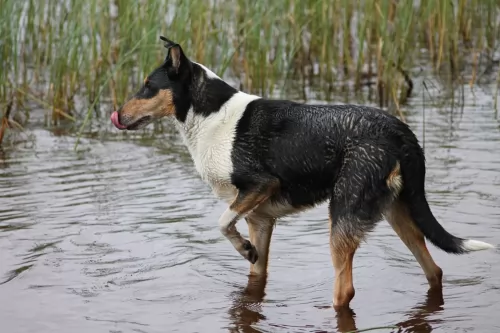 When you see the Smooth Collie you just assume that you’re looking at a long-haired Lassie-type Collie that was sent to the groomers.
When you see the Smooth Collie you just assume that you’re looking at a long-haired Lassie-type Collie that was sent to the groomers.
The Smooth Collie has always been used for herding purposes and is a short haired version of the Rough Collie. The early history of this dog is unknown and there are quite a few stories surrounding its history.
It seems as though the dog’s history started during the reign of Queen Victoria who is believed to have owned these dogs.
In some countries it is thought that the smooth- and rough collie are one and the same while in other countries they are classified as separate breeds. The dog hails from the United Kingdom and they classify the Smooth Collie as a separate breed from the Rough Collie.
 The Braque Francais Gascogne is a larger dog than the Pyrenees breed and is a very handsome dog. Both have a deep chest, a solid bodies, strong and slender legs and are well-proportioned. They have padded, round paws and a large brown head with floppy ears. The muzzle is a pointed block and he has a scissors bite, with a black nose and dark or amber eyes. The eyes are very expressive and round. The tail can be straight and long, or it can be docked. They are tall and athletic.
The Braque Francais Gascogne is a larger dog than the Pyrenees breed and is a very handsome dog. Both have a deep chest, a solid bodies, strong and slender legs and are well-proportioned. They have padded, round paws and a large brown head with floppy ears. The muzzle is a pointed block and he has a scissors bite, with a black nose and dark or amber eyes. The eyes are very expressive and round. The tail can be straight and long, or it can be docked. They are tall and athletic.
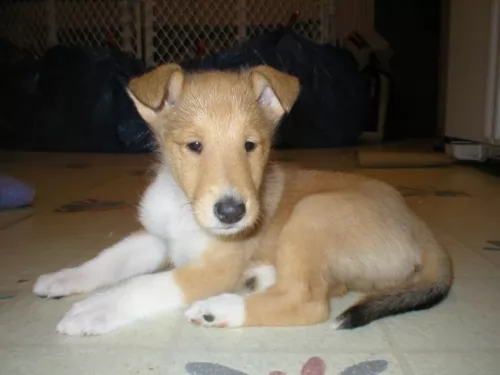 The Smooth Collie is a medium to large sized dog, ranging in size from 51–56cm and weighing anything from 18kg to 30kg.
The Smooth Collie is a medium to large sized dog, ranging in size from 51–56cm and weighing anything from 18kg to 30kg.
The Smooth Collie is slightly longer than it is tall and he has a deep chest. Most people are very familiar with the sweet, gentle expression of the Collie dogs.
The dog also has the long slender head, the semi-erect ears and a long tail. The coat of the Smooth Collie is dense and long with the outer hair being straight and harsh. The Smooth Collie comes in different colors – fawn, reddish brown, white,grey, black and tan.
The Smooth Collie is generally an amicable dog, sociable and friendly. He loves his human family and wants to be constantly with them, showing signs of separation anxiety when left for long periods on his own.
He is intelligent too so that he is easily trained. He is totally non-aggressive but that doesn’t stop him from being an excellent watchdog and he’ll alert you to strangers approaching you or your home.
They’re also energetic dogs and will require regular exercise. Although these Smooth Collies make splendid family pets, they are still used for herding purposes.
 This is a working breed, but they are nevertheless friendly and loyal to their families. They want to please their people and are usually docile. They love kids and are good as a first ever dog. They are friendly and even-tempered. They tolerate people they do not know but can be shy and are not guard dogs. instead they are loving, affectionate and people oriented. They need to be with their families and never left outside alone. They can develop separation anxiety.
This is a working breed, but they are nevertheless friendly and loyal to their families. They want to please their people and are usually docile. They love kids and are good as a first ever dog. They are friendly and even-tempered. They tolerate people they do not know but can be shy and are not guard dogs. instead they are loving, affectionate and people oriented. They need to be with their families and never left outside alone. They can develop separation anxiety.
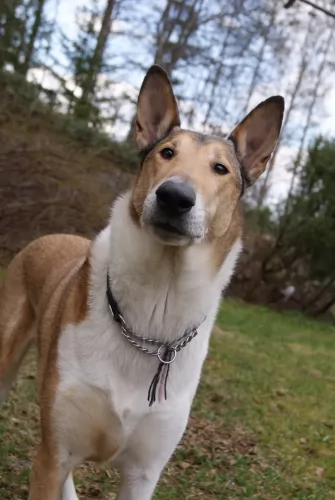 Not only is he intelligent, he is playful and energetic too, making a good pet for children and tolerating other pets too.
Not only is he intelligent, he is playful and energetic too, making a good pet for children and tolerating other pets too.
Add to that the fact that he is a a good watchdog and wants to protect his family. Sweet and gentle, the Smooth Collie is guaranteed to make a wonderful addition to your family.
 The Braque Francais is a fairly healthy breed. They are susceptible to certain health conditions that most dogs of their size and working history are susceptible to. These include Patellar luxation which seems to be one of the most common problems for them. They also can have hip and/or elbow dysplasia, aortic stenosis which is a narrowing of the aorta, and some eye issues such as ectropion, entropion, and PRA (Progressive Retinal Atrophy as well as cataracts.
The Braque Francais is a fairly healthy breed. They are susceptible to certain health conditions that most dogs of their size and working history are susceptible to. These include Patellar luxation which seems to be one of the most common problems for them. They also can have hip and/or elbow dysplasia, aortic stenosis which is a narrowing of the aorta, and some eye issues such as ectropion, entropion, and PRA (Progressive Retinal Atrophy as well as cataracts.
 Your gentle smooth haired collie can live to be 12 to 14 years of age if he enjoys a good life, but like with other dog breeds, they can also be susceptible to certain common dog illnesses.
Your gentle smooth haired collie can live to be 12 to 14 years of age if he enjoys a good life, but like with other dog breeds, they can also be susceptible to certain common dog illnesses.
This is when the chromosomes that determine how the eyes develop are mutated, so that the blood vessels that nourish the retina and absorb scattered light are underdeveloped. When this mutation occurs it is in both eyes, but one eye could be more severely affected than the other.
Your vet will do a complete examination of your dog’s eyes to find out what the extent of the defect is.
This is a life threatening problem where the stomach twists. It is more prevalent in deep chested dogs. It can help by feeding your dog two smaller meals a day instead of one larger one which he gobbles up quickly.
Also known as Gray Collie Syndrome, this rare disease affects the neutrophils of a dog, which are an important part of the immune system. Bacterial infections and a shortened lifespan are your dog’s lot with this illness.
 This is a high energy, working dog with a need for a high-quality energy food or raw food that you make up yourself. Be sure to include chicken, beef and fish. Feed him about 3 cups once a day or 1.5 cups twice a day.
This is a high energy, working dog with a need for a high-quality energy food or raw food that you make up yourself. Be sure to include chicken, beef and fish. Feed him about 3 cups once a day or 1.5 cups twice a day.
In addition to the conditions listed above, his long floppy ears can lead to ear infections if not cared for. Wash them out daily. He is also susceptible to bloat so don’t feed him large meals and don’t let him exercise or work right before or right after exercise.
These dogs have a variety of hunting skills. They are not only pointers but can flush, trail and retrieve. The Gascogne is not as quick as the Pyrenees. They need a lot of exercise daily or they need a hunting job. They would do well with barn hunt, lure coursing and free play in an off leash fenced in area. If they don’t get rid of their energy, they can be destructive. They were bred to hunt and cannot resist the chase,
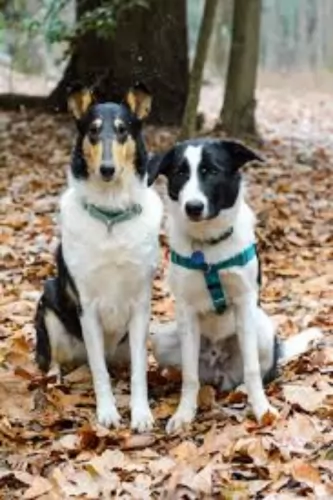 Your Smooth Collie deserves the very best food there is because of the wonderful companionship he provides you with. You want him to enjoy good health and a long life with you.
Your Smooth Collie deserves the very best food there is because of the wonderful companionship he provides you with. You want him to enjoy good health and a long life with you.
If you buy one of the commercially manufactured dog foods, make sure it is one of the best – packed with vitamins and minerals and good, natural ingredients.
Follow the instructions on the packaging for portion sizes. Also include some plain, wholesome dog food made at home. The perfect example of this is boiled chicken, brown rice or pasta and sweet potatoes, spinach and carrots all chopped up and added to your dog’s dry kibble as a treat twice a week. No need to add in exotic spices. Avoid onions.
Try and include some raw meat into the diet once in a while too. Make sure your Smooth Collie has a constant supply of fresh, cool water.
This is one of the best things you can do for your Collie, eliminating the possibility of your pet becoming a parent of unwanted puppies.
Brush your Smooth Collie twice a week. He is a moderate shedder but has a couple of heavier shedding periods.
While brushing your pet, check inside the ears for signs of infection, check that his eyes are still bright and alert and check inside his mouth for bad teeth. He can’t tell you about a rotting tooth and this can cause a host of other problems for your dog.